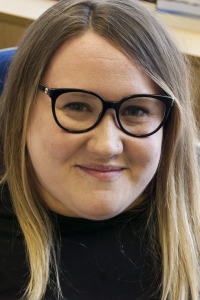Phillippa Wiseman
 Phillippa Wiseman
Phillippa Wiseman
Scottish Learning Disabilities Observatory and the Strathclyde Centre for Disability Research, University of Glasgow
Phillippa.Wiseman@glasgow.ac.uk
Dr Phillippa Wiseman is a Research Associate at the University of Glasgow located at the Scottish Learning Disabilities Observatory and the Strathclyde Centre for Disability Research. Phillippa completed her PhD in 2014 and her thesis: Reconciling the ‘Private’ and ‘Public’: Disabled Young People’s Experiences of Everyday Embodied Citizenship had a central focus on disabled people’s experiences of toileting and public toilet use. This has become the focus of ongoing research into body-management, intimacies and toileting as central to citizenship and hidden inequalities.
Phillippa’s work at the SLDO focuses on people with learning disabilities’ experiences of hate crime and violence in Scotland and its impacts on belonging and wellbeing. Here she focuses on the banality of everyday hate crime for people with learning disabilities and the profound affects that it has on physical, emotional and mental health. At the SLDO, Phillippa is also working on research into the reproductive experiences and intimate health management of women with learning disabilities in Scotland with Engender Scotland and a forthcoming project focusing on gender based violence, wellbeing and women with learning disabilities in Scotland.
Embodied citizenship, disability and the public/private divide
That the bifurcation of, so called, public and private spheres has shaped and structured the lives of women is well understood– its impact is less well theorised or empirically examined in the lives of disabled people. The relegation of bodies, in everyday life, and in the academy, to the ‘private’ sphere (and thus being of lower status) has arguably removed intimate experiences from constructions of citizenship and so has led to the pervasive and ongoing hidden inequalities that disabled people face every day. By working towards a notion of embodied citizenship, I aim to place everyday lives and felt experiences, intimacies and bodily practices at the centre of what it means to belong and feel of value – feeling states and ways of being that claw citizenship out of abstraction and have the potential to make hidden inequalities visible. Central to this is the need to bring attention to the everyday intimacies that challenge the public/private divide. I will focus on my ongoing research on (inaccessible) toilets as sites of (non)belonging and citizenship and the spaces where everyday inequalities are played out and felt. Similarly I will draw on my research with young disabled people and their experiences of relationships, sexual health and body management.
In locating belonging as central to embodied citizenship we are able to critique everyday ableist practices and structures that articulate who is welcome and in what spaces. It also allows us to challenge dominant able-bodied, heteronormative, white, male assumptions about what citizenship is and how it should be enacted or lived. Injustice, discrimination and inequality are embodied events; they are felt, perceived and they have profound impacts on sense of self and personhood. Here I will position body-management at the very centre of citizenship.